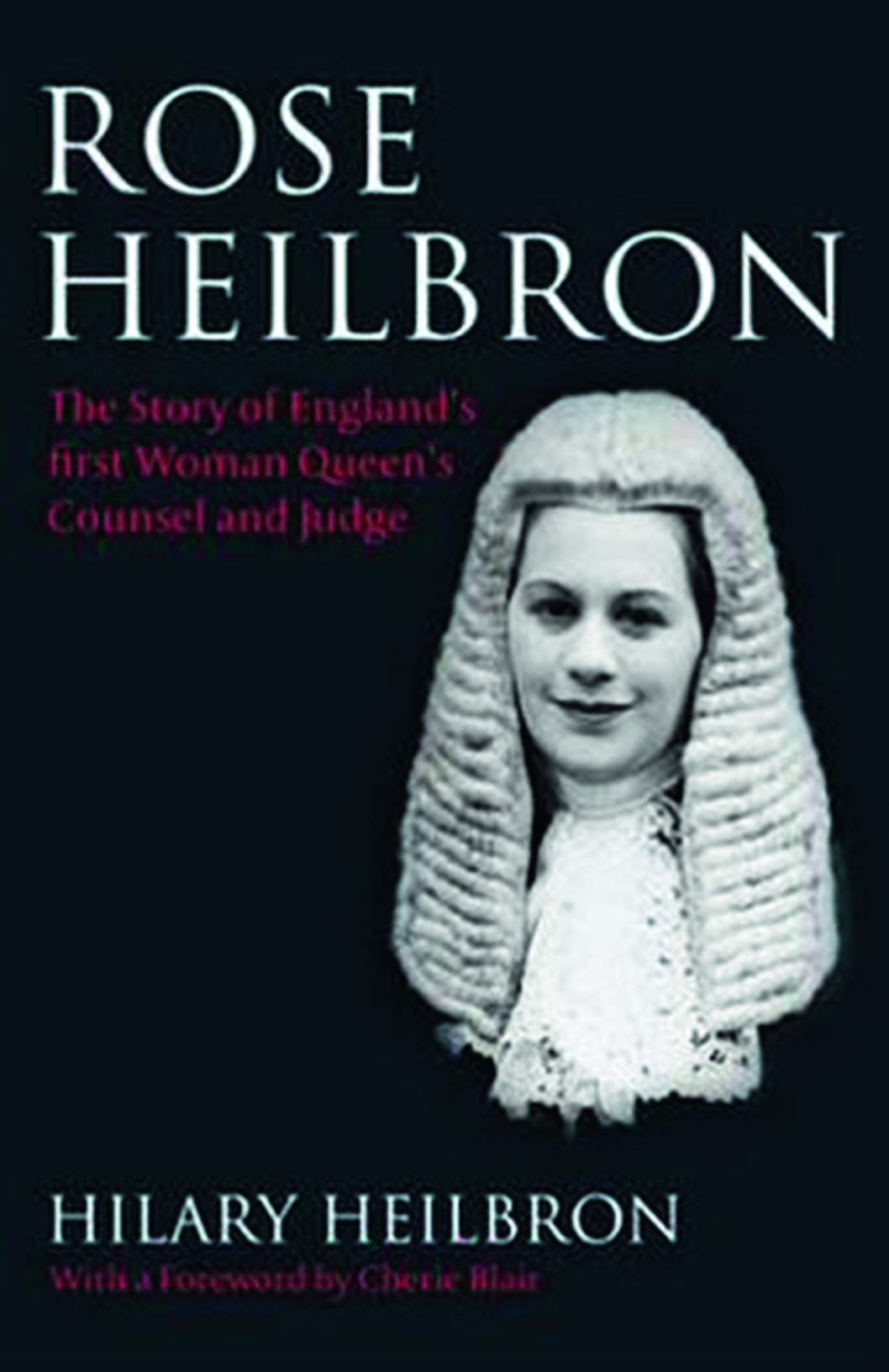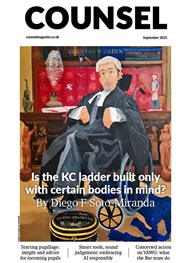*/
 Rose Heilbron: The Story of England’s First Woman Queen’s Counsel and Judge
Rose Heilbron: The Story of England’s First Woman Queen’s Counsel and Judge
by Hilary Heilbron
Published by Hart Publishing, October 2012.
ISBN 1849464014
£20
The story of Rose Heilbron’s life, written by her daughter Hilary Heilbron QC, provides an inspiring account of her determination to succeed in a difficult profession. At the time that she began her career there were very few female barristers. She faced difficulties in obtaining pupillage as many members of chambers and clerks were reluctant to take on a female pupil. She began practice during the war years when many male barristers were away on active service.
By the time they returned, however, she had become so successful that in 1949, at the age of 34, she became one of the first two women Silks. She undertook numerous high profile cases in both the criminal and civil courts. In due course she became the first woman appointed as a Recorder (of Burnley) and the second female High Court judge.
The book highlights the difficulties that she faced and also describes the intense press coverage generated by the success of a female barrister coming to prominence over half a century ago. It is clear that this was uncomfortable for her at times, but that she also used it to great effect in generating publicity for women’s rights. She combined this with railing against the social stigma of being a working mother. She did it not by strident feminism, but simply by getting on with the job in hand.
Whilst the book benefits a great deal from the very close relationship that its subject had with the author - it is written with a warmth and familiarity that is borne out of that relationship - there is a sense that the reader is being held at arm’s length. Indeed, the author does state in the preface that she knew that her mother was a private person and that she has tried to respect that whilst writing the book.
The book has an enjoyable balance between Rose Heilbron’s professional life and the relationships that she had as a wife, mother and friend. A particularly enjoyable aspect is the detail of notable cases in which she was instructed. There is similar care taken in describing her personal life. The author clearly carried out a great deal of research into her mother’s childhood and early life at the Bar.
The result is that the book achieves its stated aim of making itself accessible both to lawyers and to the general public. Where necessary, the law and procedures are explained swiftly and succinctly for laymen, whilst preventing the attention of lawyers from waning at the recital of ‘trite principle’.
A particularly interesting feature is the comparison between life at the Bar for Rose Heilbron, and life at the independent Bar today. Notably, in the period before television and mass media, there were endless queues and an almost macabre fascination with capital murder trials. More familiar to us are the complaints of fees for criminal work being disappointingly low.
Rose Heilbron’s career was truly remarkable and her success laid the foundations for many other women to join the profession, including, of course her daughter. It is true that new entrants today consist almost equally of men and women and that the Bar has made great strides towards equality. However, there are still too few women in senior positions within the profession and judiciary. This was something that Rose Heilbron struggled with herself. Despite her success, she faced a rather long wait (she was 60) before she was invited to join the senior judiciary. The book deals with this sympathetically, whilst hinting at the need for continued progression towards equality.
In all this was an interesting and inspiring read about a fascinating life.
Catherine Brown is a barrister at Furnival Chambers. She practises on the South Eastern Circuit, specialising in Criminal Law. She is currently seconded to the CPS Extradition Unit.
Whilst the book benefits a great deal from the very close relationship that its subject had with the author - it is written with a warmth and familiarity that is borne out of that relationship - there is a sense that the reader is being held at arm’s length. Indeed, the author does state in the preface that she knew that her mother was a private person and that she has tried to respect that whilst writing the book.
The book has an enjoyable balance between Rose Heilbron’s professional life and the relationships that she had as a wife, mother and friend. A particularly enjoyable aspect is the detail of notable cases in which she was instructed. There is similar care taken in describing her personal life. The author clearly carried out a great deal of research into her mother’s childhood and early life at the Bar.
The result is that the book achieves its stated aim of making itself accessible both to lawyers and to the general public. Where necessary, the law and procedures are explained swiftly and succinctly for laymen, whilst preventing the attention of lawyers from waning at the recital of ‘trite principle’.
A particularly interesting feature is the comparison between life at the Bar for Rose Heilbron, and life at the independent Bar today. Notably, in the period before television and mass media, there were endless queues and an almost macabre fascination with capital murder trials. More familiar to us are the complaints of fees for criminal work being disappointingly low.
Rose Heilbron’s career was truly remarkable and her success laid the foundations for many other women to join the profession, including, of course her daughter. It is true that new entrants today consist almost equally of men and women and that the Bar has made great strides towards equality. However, there are still too few women in senior positions within the profession and judiciary. This was something that Rose Heilbron struggled with herself. Despite her success, she faced a rather long wait (she was 60) before she was invited to join the senior judiciary. The book deals with this sympathetically, whilst hinting at the need for continued progression towards equality.
In all this was an interesting and inspiring read about a fascinating life.
Catherine Brown is a barrister at Furnival Chambers. She practises on the South Eastern Circuit, specialising in Criminal Law. She is currently seconded to the CPS Extradition Unit.
 Rose Heilbron: The Story of England’s First Woman Queen’s Counsel and Judge
Rose Heilbron: The Story of England’s First Woman Queen’s Counsel and Judge
by Hilary Heilbron
Published by Hart Publishing, October 2012.
ISBN 1849464014
£20
The story of Rose Heilbron’s life, written by her daughter Hilary Heilbron QC, provides an inspiring account of her determination to succeed in a difficult profession. At the time that she began her career there were very few female barristers. She faced difficulties in obtaining pupillage as many members of chambers and clerks were reluctant to take on a female pupil. She began practice during the war years when many male barristers were away on active service.
By the time they returned, however, she had become so successful that in 1949, at the age of 34, she became one of the first two women Silks. She undertook numerous high profile cases in both the criminal and civil courts. In due course she became the first woman appointed as a Recorder (of Burnley) and the second female High Court judge.
The book highlights the difficulties that she faced and also describes the intense press coverage generated by the success of a female barrister coming to prominence over half a century ago. It is clear that this was uncomfortable for her at times, but that she also used it to great effect in generating publicity for women’s rights. She combined this with railing against the social stigma of being a working mother. She did it not by strident feminism, but simply by getting on with the job in hand.


Chair of the Bar sets out a busy calendar for the rest of the year
By Louise Crush of Westgate Wealth Management
Examined by Marie Law, Director of Toxicology at AlphaBiolabs
Time is precious for barristers. Every moment spent chasing paperwork, organising diaries, or managing admin is time taken away from what matters most: preparation, advocacy and your clients. That’s where Eden Assistants step in
AlphaBiolabs has announced its latest Giving Back donation to RAY Ceredigion, a grassroots West Wales charity that provides play, learning and community opportunities for families across Ceredigion County
Rachel Davenport, Co-founder and Director at AlphaBiolabs, outlines why barristers, solicitors, judges, social workers and local authorities across the UK trust AlphaBiolabs for court-admissible testing
Despite increased awareness, why are AI hallucinations continuing to infiltrate court cases at an alarming rate? Matthew Lee investigates
Come in with your eyes open, but don’t let fear cloud the prospect. A view from practice by John Dove
Looking to develop a specialist practice? Mariya Peykova discusses the benefits of secondments and her placement at the Information Commissioner’s Office
Anon Academic explains why he’s leaving the world of English literature for the Bar – after all, the two are not as far apart as they may first seem...
Review by Stephen Cragg KC